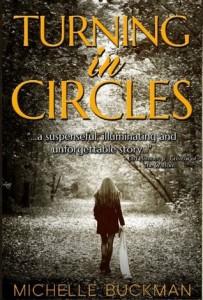 Within a sleepy farm community along the South Carolina coast, two families coexist. The Thaines and their neighbors enjoy hard work, hospitality, horseback riding, pie, ice tea, kittens, and each other. The Darlingtons favor extortion, white privilege, domination, abuse, dog fights, and freedom from the consequences of their nefarious activities.
Within a sleepy farm community along the South Carolina coast, two families coexist. The Thaines and their neighbors enjoy hard work, hospitality, horseback riding, pie, ice tea, kittens, and each other. The Darlingtons favor extortion, white privilege, domination, abuse, dog fights, and freedom from the consequences of their nefarious activities.
Turning in Circles brings the Thaines and Darlingtons into conflict. A love story but not a romance, it describes how the sins of the parents—adultery and neglect—reemerge in the tragic delinquency of their children—youthful indiscretions that expose the Thaines to the dark desires of the Darlingtons.
The Thaine matriarch locks herself in her studio to focus on her artistic labors, while Daddy Thaine works the fields and pastures from sunup to sundown. He charges his daughters, Savannah and Charlie, with the responsibility of feeding and cleaning up after the horses and chickens. Savannah dutifully obeys, but Charlie evades dirty work, ignores her mother, and fears that her father has rejected her.
More than anyone else, Savannah Thaine loves her sister, Charlie. “Vannah” plans an idyllic life for the two of them, never leaving their rustic microcosm, much like the relationship between their mother and her sister, Myrtle. Charlie has a different idea, though. She craves love and validation from bad boy Dillon Smith—dark-eyed and “trouble on two feet from the day his mama left.” Dillon dominates and controls Charlie, as he drags her into his sinister world. Despite Savannah’s pleadings and warnings, Charlie drifts ever closer to disaster, compromising her family and dashing Savannah’s dreams.
Savannah realizes that Charlie is on a dangerous path, but cannot sway her from it. She is unwilling to expose her sister to parental censure, fearing she would lose Charlie’s love. Savannah views Charlie as a second self, spoiling her and shielding her from parental wrath. When Dillon captures Charlie’s affections, Savannah slips into codependency, enabling Charlie’s secret life. Throughout the narration, Savannah laments her cowardice. If only she had acted.
Sheriff Darlington ensures that his relatives, including Dillon Smith, escape the consequences of their frequent felonies and misdemeanors. Those outside the Sheriff’s clan, such as the Thaines, not only feel the full weight of the law but suffer blackmail and intimidation. Charlie’s delinquency provides the leverage the sheriff needs to destroy the tranquility in the Thaine family. Darlington demands that Daddy Thaine sell him Boudicca, a barely tame mare of spectacular beauty, if he doesn’t want Charlie to go to jail. Charlie senses her father’s resentment, which drives her deeper under Dillon’s control.
Savannah, the narrator, dominates the novel. She is aloof, inflexible, and naïve. She fails to reach most of her goals. The warnings she directs at her sister miss their mark, but change the lives of bystanders. Her dream to live like her mother and aunt is shattered, but she finds that after a horrible gloom there is a new dawn, as she grows into adulthood.
Analytical and inflexible to a fault, Savannah frequently dissects words and gestures, inferring deeper meanings and sinister plots. Despite her cerebral inclinations, her family and classmates describe her as naïve. In her search for deeper meanings, she often ignores the obvious. For instance, although she spends almost every free moment with Ellerbe, the boy next door, she dismisses him because he doesn’t fit into her plans for the future, and she thinks he’s incapable of understanding the implications of recent events. Ellerbe, less given to introspection, believes that a horseback ride is the solution to every problem in the world. Horses feature prominently in the story: Ellerbe loves his mare, Snow, as Daddy Thaine dotes on Boudicca. Woe to the Darlington who threatens the love between a man and his horse.
Although this is a young adult novel, its realism should alert parents to the possibility that their behavior could cost them their children’s loyalty. Parental examples, their obsession with their own concerns, their betrayals-especially adultery-can deeply scar their children, distorting their values and behavior.
Michelle Buckman’s tale opens during August’s heat and humidity—slow and sleepy—but climaxes with the impact of a diesel locomotive hitting an eighteen wheeler packed with dynamite. She bolsters her prose with sensory tones and often drifts into a poetic imagery that may lull her readers into complacency before the shocking climax.
Buckman succeeds in creating a gripping novel that burns its way into the reader’s memory. Turning in Circles begins on a tranquil beach, but ends on the shore of a different emotional galaxy.